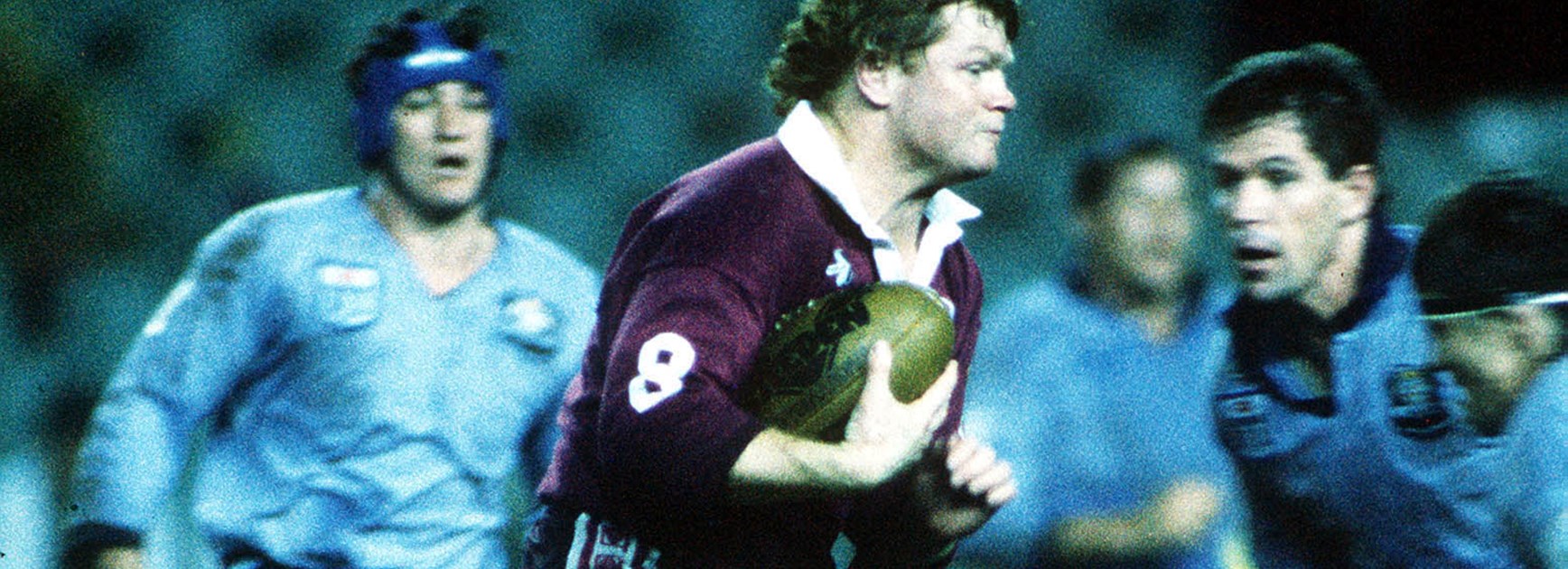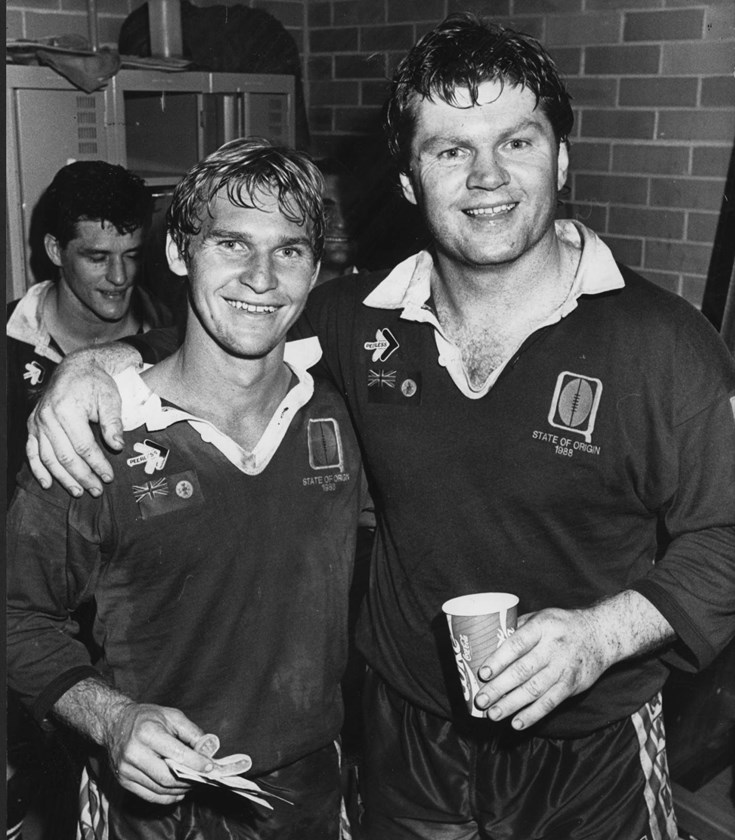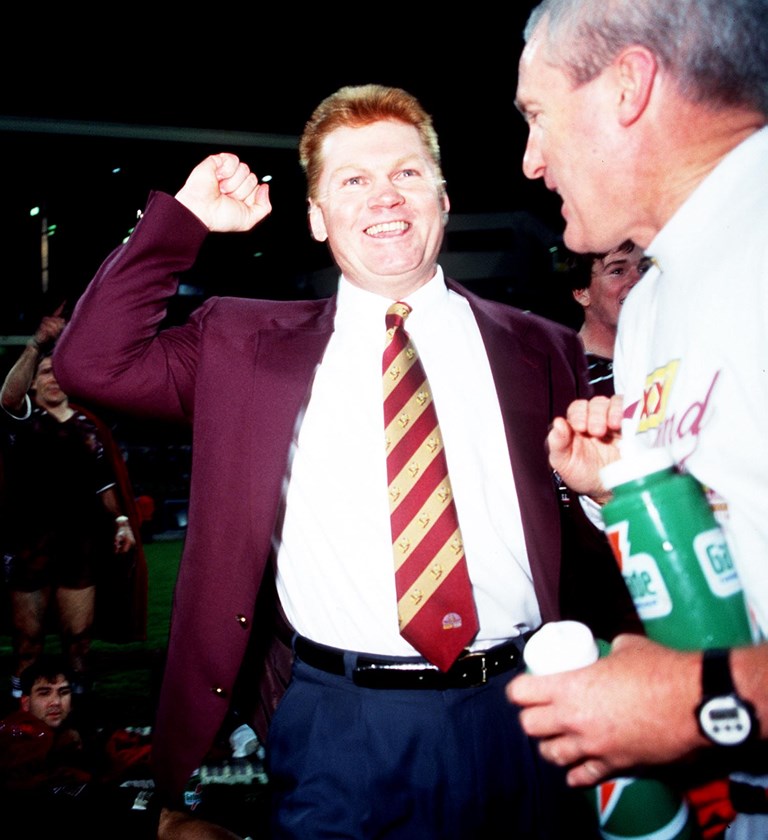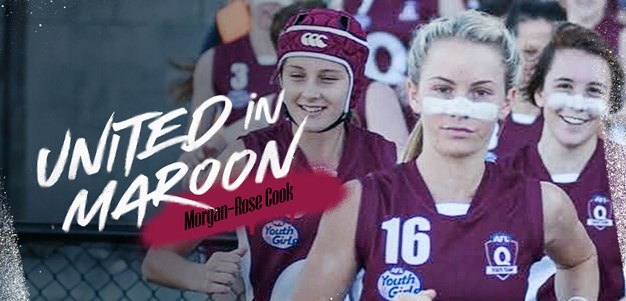
Growing up in Brisbane and being a rugby league fanatic, you had to support Queensland. It was like going to church on Sunday, it just had to happen in the 70s.
You had to support Queensland. It's the way it was.
My childhood memories are of going to Lang Park during the 70s with my dad and watching Queensland get beaten - sometimes flogged, sometimes very close.
We just couldn’t beat New South Wales because they were just too good. In their teams, there wasn’t a lot of Queenslanders, but they did have a couple of really special ones.
Arthur Beetson was the one that just kept coming to Lang Park in a blue jumper and beating us. We always went home pretty sad.
I remember one series we drew two games. Back in those days they would play on a Tuesday night and again on the Sunday... two interstate games in a row at Lang Park. And we drew 4-4 on the Tuesday and 13-13 on the Sunday. That was, for us, a win, because we couldn’t get near them… they were that good.
Obviously when State of Origin came around I didn’t make the first game or the second, but in 1982 I was down at Manly and I got picked to play in the first three-game series in the lock forward position and I ended up playing 22 games for Queensland across almost a decade.
When I stood on the field in the Queensland jumper, that’s when I used to look around at the crowd and I got it pretty early that ‘this is a special moment’... an honour for me and all of us on the field.
Paul 'Fatty' Vautin FOG #22
What were we playing for? You know what we were playing for… we were playing for those people in the crowd. That’s what we were playing for. We were playing for every Queensland supporter who in actual fact wanted to be where we were, in that jumper. But we were the ones who were chosen and they were there to support us.
That quickly grew and grew and grew until 1995 when I’m retired and coaching and we had a team that was made up of has-beens, retrogrades, desperates… against a team that had 11 internationals.
5 - Neville nobodies win unwinnable series
All we had was 'you know what… let’s just keep playing hard in this jumper’. And we won that series 3-0. I transferred everything I learned as a player and played for as a player to the coaching.
Taking a few steps back, my dad played footy in Brisbane during the 1950s and he won a competition. Duncan Hall, he played for Wests in Brisbane, was his fellow prop. As a kid growing up, I played for a junior club called Wests Mitchelton. I started playing when I was seven and just kept playing.
Dad and mum were my biggest supporters – went everywhere, took us everywhere, training in the rain… they’d hang around and wait. As a kid, you grow a bond with your mum and dad through that, and in the end he was living his life through how I played and it’s the same for Wally Lewis and Gene Miles… our parents were always so supportive. That’s why we had a love for the game.
My dad played at Lang Park. He had one chance to represent. He got picked on the Sunday night. Great Britain were touring in 1954 and he got picked on the Sunday night and he’d cut his eye. It was going to be his first ever rep game in a Brisbane jumper. By Tuesday they were going to play at the Exhibition ground, but his eye was completely covered over and infected so he couldn’t play. He used to tell me about it and about how he wished he could’ve played. So right from the outset, playing for Queensland, I took that on board.
And so, this sounds a bit weird, but I actually put him on the right shoulder and took him along my journey... he’d be with me. It’s almost like when I was tired and completely buggered, and I could hardly raise a spit, hardly run, he’d be in my ear going ‘come on.. come on.. this is Queensland you’re playing for’. I just had him there for the whole of my career. I did it because he missed out on that one representative game. I wanted to make him proud by doing my best in that Queensland jumper.

That was just one thing, but it wasn’t just that. The bond that we formed as a team in the 80s… there was at least nine of us born in 1959. We were all playing rep footy in 1982 in the Queensland team.
Mark Murray, Gene Miles and I are actually birthday brothers, born on the same day in 1959. In July. Chris Close, Wally, you name it… Colin Scott, all babies of ’59… we were all pretty close. All the same age and formed this bond that went right through to the late 80s when a couple of guys got disbanded through form or injury or whatever. We just played for each other.
If I’m standing on the try line and we’re defending, and I’ve got Wally Lewis on one side and Trevor Gillmeister on the other, there’s no way I’m going to let them down. I’m just going to play as hard as I possibly can. That’s how we all felt about it, playing in that Queensland jumper.
Wally would say we felt 10-foot tall and bullet-proof. Well, that’s just about right.
We hated NSW, I can tell you. The hate was real, back in the 80s. We felt that they thought we were never good enough for them. That’s what Queensland felt during the 70s and transformed in the 80s. We felt ‘they think we’re second class citizens, they think they’re so much better as a rugby league player that we are’. We felt they disrespected us. We really did.
We soon showed them we can go with your best and beat you. We won in the 80s in the three-match series. We won ’82, ’83, ’84 and then ’87, ’88, ’89. So we won six of eight series in the 80s. We lost ’85, ’86. We just played as good as we could.
The thing is, I was a battler, but you’ve got to have battlers in your team, right? Players of the elk of myself, Trevor Gillmeister, Bryan Niebling, Wally Fullerton Smith… we were good players, but not elite. We’re not Noel Cleal, Ray Price, Wayne Pearce, Paul Sironen… you know what I mean?
We got around that. I had a saying I said to myself my whole career, especially in the Queensland jumper. And that was ‘keep turning up’. If you just keep turning up and putting yourself in the game, then you’re going to be effective.
Once again, if I got tired, dad is going ‘come on mate, keep turning up, keep turning up, get in the battle, stay in the battle’. This is what we did. We stayed in the battle. We did have one guy called Wally Lewis who was pretty good. He was our star. But he couldn’t have done what he did without the toilers. And he knows that, he talks about that. That’s what we were… toilers. We did all of the hard work and then he combed his hair, had a cup of tea and came in at the end to score a try. That’s when he had hair.
11 - Wally's famous try in 1989
I think that hatred left in the 2000s because everyone is so professional. It was actually genuine back in the 80s. There was a famous thing... there was an Australian tour in 1985 that I was on. It ended up, we hardly spoke a word to them for three weeks. Terry Fearnley was the NSW coach and he hated us. Dropped four Queenslanders after the second Test and oh my god, it was bedlam. We had a mid-week game and myself and Greg Conescu were doing the stats and Ben Elias was the NSW hooker and we were playing Auckland or something and blah, blah blah… I’m doing the tackle count and anyway, at the end of the game Terry Fearnley, the coach, came up to me and said ‘can I have the stats please?’ I said ‘here you are mate’. And he’s looking at them and goes ‘Elias… 35 missed tackles’ and I said ‘yeah mate, he had a shocker today’. Anyway… he still picked him.
If you’re a rugby league player, the Queensland jumper is something that you have to honour. It’s such an honour to play in it. I know it means a lot to the current Queensland players... what I’m saying is we played with quite a lot of hatred. To be honest, that’s all gone because everyone is so professional now. What they’re playing for now is for the Queensland jumper, for our fans, for the people who follow us, who want us to win, who want to be in our boots, but they can’t. That’s who we’re playing for now.
For the Maroons, the jumper still means everything. To me, that’s the difference between us and them. I’ve never heard any one of those guys ever say ‘let’s play for a blue jumper’. For the Maroons, it’s something different, it’s something special.
When you’ve got the 34 best players in our country – that’s what makes it so special. It’s 17 versus 17. Maroons versus Blues. Queensland versus NSW. To me, it doesn’t get much better.
I have a million memories. I could go on and on.
We won ’82, ’83, ’84 and then we got beaten ’85, ’86. I broke my arm in ’86… I didn’t play, I had to sit on the sideline and watch. We got beaten 3-0, which was no good, but in 1987 we lost the first game. Mark McGaw scored in the corner and Wayne Bennett is in the crowd, going ‘oh no’. The great Dick ‘Tosser’ Turner, the late great manager, took him for a walk and said ‘Wayne, if we lose today, you will never coach Queensland again’. That’s what he was told. Because he was the coach in ’86 when we got beaten 3-0.
That particular game was a ripper. We were down 6-0 after 20 minutes. Muddy SCG. And we came back and won 12-6. Then we go to the last game in ’87. The hardest game that I played in, in Origin. But there’s a couple of things in it… there was the Wally tackle on Mick O’Connor in the second half. Mick O’Connor makes a break down the grandstand side. The left hand side of field, looking north. He had a great step but Wally was over there in cover and just nailed him and drove him into the turf. It’s a well-highlighted, publicised tackle.
But the other one, as a player, was during that game… we were leading 10-8 at half-time and you know, this is the series on the line. I remember at half-time, Bennett spoke, Wally spoke, and then Wayne said ‘anyone else?’. I was the unofficial vice-captain. I said ‘this might seem really simple and stupid, but if they don’t score, we win’. So the thing being, let’s defend like our lives depend on it.
It’s Origin, you’ve got to lift. So they made a break down our left-hand side, second half again, getting towards the end of the game… Cliff Lyons and Brian Johnson went down that left-hand side. Gary Belcher, I don’t know how he did it... he made a tackle on Cliff and Cliff passed the ball. Then Gary Belcher turned and chased down Brian Johnson with one metre to spare. It’s one of the greatest Origin tackles ever made. I still don’t know how he did it. It was amazing.
This is what Origin does to players.
A 'me moment' I remember… a tackle no-one knows I made... no-one has ever mentioned it, but I know I made it. It was in the second half, I’d made a tackle in the middle of the field and the ball was going to go right. Normally for a marker, if you mark up, you normally just cover… move two or three metres to the left or to the right and cover. But this is what Origin does... I don’t know why I did it but for some reason, I thought 'I’m just going to keep wandering to that side in case something happens'. So Wayne Pearce makes a break. And he’s sprinting away. I ran across 30 metres and I nailed him. He wasn’t going to score a try and wasn’t even going to set one up, but I just stopped the movement.
The point being, because it was Origin, because I was in the zone, and I was Origin crazy, I just felt as though 'I shouldn’t be going over there but I’m going to just in case something happens'. And it’s an Origin moment for me, that epitomises for me, what Origin is. I was buggered, I'd probably made 40 tackles by then and I was hurting, I was bruised, I was battered, but that’s what you do in Origin. You make that extra effort to make a run or a tackle. And that’s it. That’s just one little moment of mine, but we all did it. Trevor Gillmeister did it. Wally Fullerton Smith did it. Sam Backo did it. Martin Bella did it.
Greg Dowling was incredible. The Greg Dowling catch from the Wally kick in ’84. That was incredible. Greg Dowling... he was a good player. If I was going to pick a Queensland ‘best of’, he’d be my first pick. I think he played 11 Origins and a lot of guys played more, but he’d be the first prop I’d pick. He was rangy, he was tough, you couldn’t hurt him, he had skills. He put through a grubber. He was so good.
20 - Dowling's try off the crossbar
Again, the ’95 series was just something else. That was something special. The height of the Super League, they couldn’t find a coach. When Ross Livermore rang me, I said ‘mate, how many people have you rung? 20? 30?’ ‘No, no, no…you’re the second’. Wayne had stood down. It was an amazing, unbelievable experience. One of my favourite moments, because we won the first game 2-0, we could win the series in Melbourne, so we’re down in Melbourne, and the last minute of play, we led 14-12 and they had a try disallowed, with one minute to go, and then Brett Dallas picked up the ball and ran 95 metres. That’s one of my favourite moments… seeing the little redhead run away. And he’s yelling out at the Blues who are trying to chase him. It was gold. Yelling as he sprints away from them.
But even then, after we won that second game, the most important game to me was the third one because now we’re back at home, right, and we’re playing in these most honourable, fantastic jumpers, and we’re in front of our home crowd. They’d be waiting a month to see us. Most of them expected us to be playing to try and win a game because we were rank outsiders, but here we were, we’d won the series, and now this was the cream. Wow, that was so good.
One of the great moments was once again, the final try. We put up a bomb and their fullback dropped it and Benny Ikin, who’d been on the bench, he picked up the ball. He ran, well no, he waddled because he’d put on about 12 kilos during one of my high intensity camps. He put on 12 kilos in six weeks, so he waddled over for the try. It was 3-0.
I’ve spoken to Paul Harragon about that series. He doesn’t like talking about it, right? I actually said ‘when we got together, what did you think?’ He just said ‘mate, we thought ‘this will be a piece of piss… we’ll beat them by 50’. I said ‘so you disrespected us?’ and he said ‘yeah we did’. I said ‘how’d that go for you?’ and he said ‘well, we got beaten'. The thing was, they treated us with contempt, and disrespected us, and paid the price, 3-0.

One of the most important words in rugby league to me, especially Origin, is the word ‘respect’. Now for us, during the 80s, it was ‘we’re going to smash them’, ‘we hate them’, ‘we’re going to hurt them’. But, respect them. Because the minute you don’t respect another player, an opposing player, that’s the minute that he steps around you and scores a try because you think ‘I’ve got this bloke covered’. No you haven’t mate, because if you disrespect him, that’s when he gets on top.
I always respected the players I played even when I didn’t like them and I didn’t like a lot of them. Ben Elias… no one liked Ben Elias. But, he was such a good player, you had to respect him and you treated him that way. But if you could get one on him, that’s what you did. Garry Jack… everyone wanted to take him out. But he was such a good player, you couldn’t treat him with disrespect.
So respect is such a massive word – not only in rugby league, but in life really. You have to respect people. And so, we treated NSW in ’95 with complete respect. I kept saying to them ‘look at Andrew Johns… he can do this, and this, and this, and this. But that doesn’t mean that you can’t get on top of him, because you’re going to keep turning up and not slack off'.
In that third game, Trevor Gillmeister had picked up a nick on his knee in Melbourne, on the clay at the MCG, and he spent the week of our training camp, five days of it, in hospital. So he comes back into camp on the last day and it’s six o’clock, team meeting, and I go into his room. I go ‘mate, what are you going to do?’ The doctor said ‘mate, he’s still sick’. He said ‘he’s got blood poisoning, septicemia, if it gets worse during the game, he actually could die.. I’m telling you, I’m not joking’. I said ‘okay, leave it with me’. I went to Trevor and said ‘what do you think?’ and he said ‘not sure’ and I said ‘I need an answer, I need a definitive yes… if you are to go out tonight and captain Queensland to a 3-0 victory, get chaired off around the field, stand there with the shield as a captain who won, and later get picked to play for Australia'. He’d never played for Australia, Gilly, he was 32. I said ‘mate, I would get out there and play… that’s what I’d do’. He goes ‘well you should have said that 10 minutes ago… let’s go’. I said ‘just one thing… the doctor did say to me that if you play there’s a chance you can get septicemia through your whole body and die’. He said ‘well Fat, what a place to do it, let’s go’. That’s exactly how it went. No embellishment. Took him back into the room and everyone clapped and out he went.
To be honest, he didn’t have his greatest game, but just the fact that he took the field for us as captain meant so much to the rest of the players. We won 24-16. Chaired off the field, made a speech, winning captain, ambulance backed up to our dressing room and wheeled him straight on a stretcher and he spent the next couple of nights in hospital. One of the great Origin stories.
Again, I could go on for hours.
I think as a child you’re not worried about or thinking about what the jumper means. All you want to do is have one on, that’s it. As you get older, you understand what it means. As children go through their junior footy, they aspire to play in one. It’s hard to get one. They don’t give them away. You’ve got to earn it.
As kids, we never had Queensland jumpers to buy. Or even a club jumper. You couldn’t have one because you just couldn’t buy them. I had my denims on. Denim jeans and a denim shirt… didn’t come much better. With a shock of red hair. I didn’t get a girlfriend until I was 23. Now I know why.
The jumper is important. To wear it is an honour.
With Billy Slater, Billy gets it. He’s one of the good ones who gets the Queensland thing. Gets the jumper. He played for the jumper. He knows. He’s a good one. Great choice as coach.



